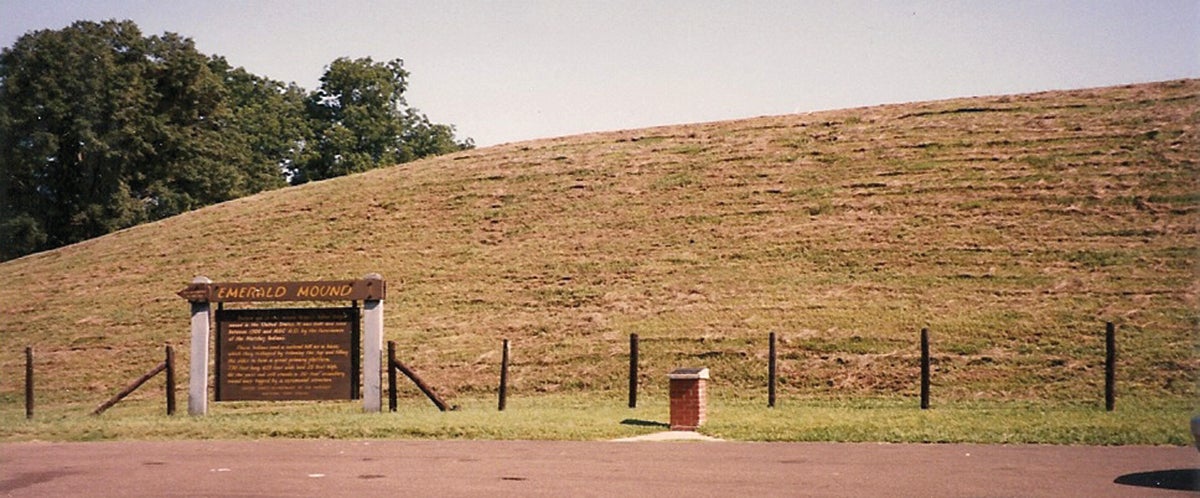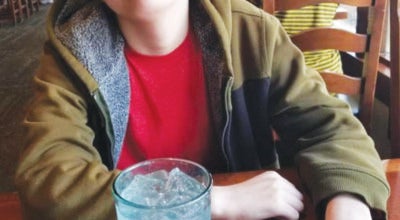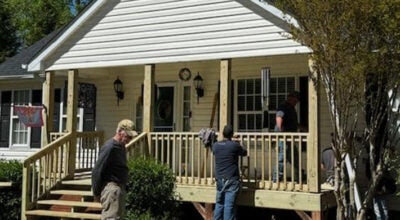The Literary Corner: Renegade Writer’s Guild
Published 9:37 am Thursday, June 16, 2022

- The Emerald Mound near Natchez, Miss.
|
Getting your Trinity Audio player ready...
|
Blessings Follow Catastrophe
By Stephanie Williams Dean
When I was a teen, my family suffered a catastrophic loss. At the time, our lives were rocking merrily along. My brother and I were enrolled in private Christian schools while my sister was away in college. My mother was a stay-at-home mom enjoying life – deeply involved with our church. Dad was happy in his element – hardware.
Then one night, the call came. In a moment – our lives were dramatically changed. I was downstairs watching TV when the phone rang. I answered. A man’s shaky voice was on the other end, asking to speak to Mr. Williams. He spoke with authority. Instinctively, I knew something was wrong and called for Dad to pick up. I listened on the other end.
“Mr. Williams, this is the Hendersonville Fire Department. We thought you’d want to know your store is on fire.”
My father had relocated his hardware store from Nashville to Hendersonville. Now in a more central location and anchored by a major grocery store chain – business was great. There were no big box stores at that time.
Mom and Dad dressed in a hurry and jumped in the car to go to the store. About an hour later, I got in my car and headed that way. When I arrived on the scene, there were police officers blocking traffic. Large fire hoses covered the pavement. I told the officer who I was, and he allowed me to proceed cautiously. By this time, the flames had been extinguished – and the fire was smoldering. Paint explosions had blown the windows out. Everything was black.
The store was gone – a total loss.
In the days that followed, my parents were devastated. As we stood out in the parking lot watching the gray plumes disappear in a black sky, tears ran down my mother’s face. “There goes our life up in smoke.” The shock of it all impacted each one of us. It wasn’t an easy time.
Dad and my grandfather worked the following year tirelessly, salvaging and rebuilding anything left. Throughout the tragedy – I don’t remember a night Dad wasn’t seated at our dinner table or a Sunday he wasn’t in church. And somehow, throughout the tremendous hardship, my parents survived it. Dad built a new store – a bigger one. Business was better than ever. My brother and I stayed enrolled in our respective schools. My sister remained in college. Dad bought Mom a new car. Slowly life turned around – and our lives resumed some normalcy.
Dad wasn’t just successful in business – he experienced success as a father, husband, and servant of the Lord. Why? Because Dad was humble, present in church, at home with his family, tithing much of what he earned, generous, and helping the needy. And he was faithful – God brought Dad through the fire, giving him a spirit of strength. A Psalm of David 62:1-2 reads, “My soul finds rest in God alone; my salvation comes from him, He alone is my rock and my salvation; he is my fortress, I will never be shaken.” NIV)
Hard times came, but Christ was with Dad through it all. We can all find strength in the Lord. Isaiah 43: 2 reads, “When you pass through the waters, I will be with you; and when you pass through the rivers, they will not sweep over you. When you walk through the fire, you will not be burned; the flames will not set you ablaze. For I am the Lord, our God.” (NIV)
God always gives us the strength we need in times of trouble – and He was with dad through this challenging time. Paul said, “I know what it is to be in need, and I know what it is to have plenty. I have learned the secret of being content in any and every situation, whether well fed or hungry, whether living in plenty or in want. I can do everything through him who gives me strength. ” Philippians 4:11-4. (NIV)
A blessing can come from catastrophe. May each of us continue to walk with faith and in the strength and presence of the Lord. Keep looking up – glorify God – and He will see you through.
Indians
By Linda H. Barnette
From childhood I have been fascinated by Indians, their history, and their culture. My first memory of this happened when I was 5 years old. My parents had driven my grandparents up to Blowing Rock one Saturday. In the gift shop I saw this gorgeous Indian doll in a green dress with a baby in a pouch on her back. Probably embarrassed by my crying when Daddy said “no,” my grandfather bought the doll for me, and I immediately named her Pocahontas. I still have her and the baby!!
Another thing I recall is my dad telling me that there was an Indian burial ground on his grandfather’s property in Davidson County. Although I never got to see it, the location is noted on some old maps that I have. And Daddy had been there when he was a child.
When I was in the fourth grade, I found a real treasure—an Indian arrowhead in the garden beside of our house. I recall taking it to school and showing it to my classmates. As an aside, there is an excellent collection of local Indian artifacts in our library.
Many years later when John and I drove through Mississippi, my curiosity was piqued again after seeing so many Indian names on road signs as we traveled to Natchez several years ago. After touring several old plantations in the city, we decided to visit the Grand Village of the Natchez Indians, which used to be the religious and political capital of the Indian chiefs in the 17th and 18th centuries. Of the 3 mounds there, one had been the home of Great Sun, the chief, and another was a ceremonial temple where the people gathered for burials and celebrations. The third one is not now visible. Many artifacts have been located in that area, as one would expect. The area is a now a park maintained by the Mississippi Department of Archives and History.
As we left Natchez, we drove up the Natchez Trace Parkway, a 444-mile road that roughly follows the “Old Natchez Trace,” a historic trail used early on by buffalo, Indians, traders, and others trying to get to the coast. The road starts in Mississippi and ends in Tennessee. There are places along the way to camp, fish, ride horses, and swim, but we were interested in the history.
At several spots there are visible parts of the old “trace,” At one spot there was an old tavern where travelers used to stop and where we could see the original trail. There were also several Indian Mounds along the way. The one that we stopped at for a close-up look was “Emerald Mound,” located about 10 miles up the road from Natchez. It was built by the Mississippians long ago, covers 8 acres, and is 35 feet high. It certainly made us wonder how long it took the people to carry enough dirt to build a mound of this size.
Mounds were used for several purposes, for burials, and ceremonial and religious gatherings. Archaeologists know for certain that the Emerald Mound was the ceremonial center of the village and was on top of the mound. This structure is also designated a National Historic Landmark.
I actually climbed to the top of the mound where the view was panoramic and breathtaking.
Our Senses
By: E. Bishop
Sight, hearing, touch, taste, smell…which would you miss the most if you lost it? Indeed, if you have all these sensory abilities still intact, be very grateful. Each one provides us with a link to the world around us and helps us capture different aspects of our environment. Each gives a unique richness to our sensory abilities so that we can fully appreciate and participate in life.
Although a loss or disturbance of any one sense can have a profound impact, there are many people that enjoy a full life with sensory disabilities. One of my first career choices was working with a state agency that provided services to people with varying disabilities. I’ll always admire Ann, a coworker who was totally deaf but could carry a caseload helping other hard of hearing or deaf individuals find their place in life. Maddie is another individual I admire immensely; she has been blind since early childhood but that has not stopped her from attending college and living on her own with the help of a trusty guide dog.
The sense of touch doesn’t seem to be too important although it is thought to be one of the first senses to develop. It allows us to receive tactile information about our internal and external environments every second of the day. We can feel temperature, pressure, vibration, pain, the light touch of something crawling on our skin among other sensations due to the different receptors in the skin. Sometimes I think it would be good if I couldn’t smell or taste; maybe I’d lose weight, but sure wouldn’t want it to be permanent! These two senses have received less scientific attention in the past but are definitely essential for our wellbeing. Loss of taste can lead to problems with dental health or some other underlying diseases. The sense of smell helps keep memories alive. All of us have probably experienced how a particular smell can remind us of something or someone. Our brains are wired to interpret all of this input from our various senses to help us survive and live a productive life.
Unfortunately, as we age, some of us begin having more health issues. Often sight and hearing are the first to give us problems. These two, if not treated, can lead to a dramatic decline in the overall well-being of a person. Depression, loss of balance, and general withdrawal from society may occur. Some experts believe these losses may contribute to cognitive decline as well.
Since I can’t afford to lose any more of my cognitive abilities, I keep up with regular eye exams and began wearing hearing aids after several years of denying that I probably needed them. My brain is still adjusting to all the sounds that I haven’t fully heard in a while, but I’m so grateful that I sought help. It is vitally important that we seek help early for not only sensory problems but any health issue for ourselves or a loved one.
Summer Constellations:
Hercules & Cygnus the Swan
By David R. Moore
Summer is a great time for stargazing, but it doesn’t get dark until much later due to Daylight Savings Time. The first of the summer constellations is not bright and best seen in dark skies. Hercules starts in the eastern and looks more like a fancy “H,” with a large trapezoid of stars making up the constellation’s center.
In Greek mythology, Hercules is known for performing twelve great labors, a penance for killing his wife in a fit of rage. The first labor was to slay Leo the Lion, using his strength and brain. (Leo the Lion is a Spring constellation.) Over the years, Hercules completed the twelve labors, and the gods rewarded him at his death by placing his body in the heavens. However, they didn’t want him to receive full honors because he murdered, so he hangs upside down in the sky.
Many constellations are named after animals, including eight birds. The largest feathered constellation is Cygnus the Swan, flying now in the eastern sky. The bright star that marks the tail of the swan is Deneb. Deneb is a huge star, two hundred times larger and 300,000 times the luminosity, but being 3,200 lightyears away, we see it as only a bright star. However, if Deneb were as close to us as the star Vega (32 lightyears away), Deneb would be as bright as a full moon and visible during the daytime. Some people named the constellation the Northern Cross since it is easier to recognize a cross than a swan. Deneb marks the head of the cross, which leans left.
How Cygnus got into the sky is a sad one involving Apollo, who was the god of the sun. His job was guiding the sun chariot with a fleet of flying white horses across the sky. One of Apollo’s sons, Phaethon, was ten years old and idolized his father. Phaethon often rode along with Apollo and studied his chariot driving. Of course, Phaethon wanted to drive the reins, but Apollo always said no. Phaethon was too young.
One day, while Apollo slept, temptation set in, and Phaethon decided he could guide the sun chariot. Not waking his father, Phaethon took the chariot to bring forth the day. However, Phaethon soon lost control of the chariot. Zeus, on Mount Olympus, saw the erratic motions of the sun and thought some scoundrel had stolen it. Zeus called Apollo to wake him. While Apollo raced to borrow the moon chariot from his sister, Artemis, Zeus shot a lightning bolt at Phaethon, spearing him out of the chariot. Apollo, unaware that his sone was falling to his death, caught up with the sun chariot and soon had it under control.
Meanwhile, Phaethon swan dived into the river Po and died. The other gods recognized the body when it surfaced and took pity, and they transformed his body into the beautiful constellation of a swan.





